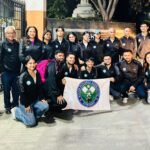With the prospect of a U.S. policy change limiting birthright citizenship under a new Trump administration, concerns are growing within the Indian immigrant community. This change could affect approximately 1 million Indians currently waiting for Green Cards, as it would mean their U.S.-born children may no longer automatically receive citizenship at birth. Such a policy shift would primarily impact children of non-citizens and those on work or temporary visas.
What is Birthright Citizenship?
In the U.S., birthright citizenship is rooted in the 14th Amendment, which grants citizenship to all individuals born on U.S. soil. This constitutional guarantee has been especially significant for immigrant families, as it allows their children to enjoy the full rights and protections of citizenship. However, proposed changes would mean that children born to non-citizen parents, such as visa holders and those awaiting permanent residency, might not receive this automatic status.
The Potential Impact on Indian Families in the U.S.
- Increased Uncertainty for Immigrant Families:
Indian professionals constitute a large portion of H-1B visa holders, and many families are awaiting Green Cards, a process that can take decades. A policy change could create legal uncertainties for their U.S.-born children, who may lack the stability and security that comes with citizenship. Additionally, if these children do not receive citizenship by birth, they could face difficulties in accessing education, healthcare, and employment opportunities within the country. - Strain on Green Card Backlog:
The existing Green Card backlog for Indian immigrants is already a significant issue, with some families facing wait times of up to 80 years. If birthright citizenship is limited, families would likely seek alternative ways to secure residency for their children, potentially intensifying the strain on an already slow system. These families might feel pressure to expedite their path to citizenship, a challenge within the complex and time-consuming immigration process. - Implications for Future Generations:
For families whose children cannot secure citizenship at birth, this policy shift would mean they must go through legal avenues to secure residency. This could discourage skilled professionals from settling in the U.S. and might push future generations to explore alternative immigration options. For India’s thriving talent pool in fields like technology, this change could reduce the appeal of the U.S. as a destination, potentially redirecting skilled labor to countries with more stable pathways to citizenship. - Social and Economic Impact on Indian-American Communities:
Children without citizenship could also face social challenges, from limited participation in public programs to an ambiguous sense of identity. The broader Indian-American community, which has contributed significantly to U.S. innovation and industry, may find itself divided, as those without citizenship rights navigate additional hurdles. This shift could potentially impact community cohesion and economic participation, particularly if these children eventually leave the U.S. due to limited opportunities.
A Call for Policy Consideration
As discussions around birthright citizenship continue, it is crucial to weigh the policy’s impact on immigrant families who contribute significantly to the U.S. economy. Policymakers will need to balance national immigration objectives with the real-world impact on families, ensuring that skilled immigrants continue to view the U.S. as a welcoming, viable place to live and work.








Leave a Reply